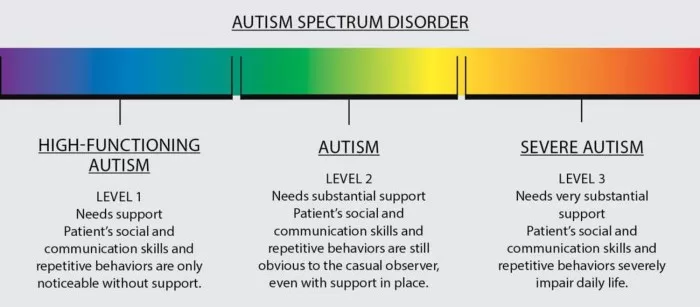Autism, or ASD, is a complex and multifaceted spectrum encompassing several behaviors and characteristics. Many wonder whether they exist on the spectrum or if their behavior is just considered “quirky.” While being quirky in the simplest sense means differing from societal norms, there is overlap, and understanding the distinction is crucial to understanding oneself.
This article will delve into autism spectrum disorder and quirkiness to understand their similarities and differences. With this understanding, we will provide clinical guidance for answering profound questions about ourselves and reasons for seeking clinical guidance.
Understanding Autism Spectrum Disorder (ASD)
Autism Spectrum Disorder (ASD) is a complex neurodevelopmental disorder that affects communication, learning, and behavior. It is considered neurological because it affects how individuals think and behave, and developmental because it typically begins early in life.
ASD is not a fixed condition and exists on a spectrum. Generally, this spectrum exists from high-functioning (needing little support) to severe (needing substantial support).
However, it’s important to distinguish that all individuals on the spectrum have unique strengths and challenges because of their ASD, and it is not simply a linear progression of severity.
Image Source: The Autism Spectrum; Anderson, Chelsea & O’Toole, Erin. Neurodiverse STEM Students and the Academic Library, presentation, July 19, 2019; University of North Texas Libraries, UNT Digital Library
Additionally, Autism encompasses a wide range of symptoms, from sensory to behavioral, and every individual experiences their condition uniquely. While these symptoms may appear as hindrances, they often provide hidden strengths and unique ways to view or interact with the world.
In the same way, quirky individuals, by definition, differ from typical human behavior but also possess unique advantages in how they view the world. However, the difference between Autism and quirkiness lies in the severity of these characteristics.
Common Characteristics of ASD
While there is variation in the characteristics and symptoms of autism spectrum disorder, most individuals with Autism have difficulty with social communication and exhibit restricted repetitive behaviors.
Specifically, the American Psychiatric Association’s Diagnostic and Statistics Manual (DSM-5) on Autism states that an individual must have deficits across multiple social contexts, including the following:
- Inability to respond to or initiate social interactions.
- E.g., Inability to recognize personal or others’ emotions, difficulty maintaining space, or knowing when to speak in a conversation.
- Difficulties in both using and understanding nonverbal communication.
- E.g., Difficulty speaking, making eye contact, understanding facial expressions, tone of voice, and hand cues.
- Deficits in maintaining or developing social relationships and friends.
- Eg, Lack of interest in making friends or maintaining friendships.
Additionally, to receive an autism diagnosis, individuals must exhibit at least two restricted and repetitive patterns of behavior, such as:
- Repetitive motor movements, object use, or speech patterns.
- E.g., Rocking, flipping, or spinning.
- Persistence on rituals, routines, or set behavior patterns.
- E.g., Lining up objects, repeatedly touching or placing things in a set order.
- Strong attachment or preoccupation with unusual or common objects.
- E.g., An obsession or intense interest in a common household object or preoccupation with a niche subject.
- Hypersensitivity (in some cases hyposensitivity, or lack of awareness) to sensory input.
- E.g., Fascination with lights, visceral reactions to sudden sounds, or excessive touching of certain textures.
Image Source: Rosen, N.E., Lord, C. & Volkmar, F.R. The Diagnosis of Autism: From Kanner to DSM-III to DSM-5 and Beyond. J Autism Dev Disord 51, 4253–4270 (2021)
While the criteria for Autism can be boiled down to a lack of communication skills and increased repetitive movements, there is vast individual variation for those with Autism.
Further, individuals must meet all 3 of the social deficits and 2/4 of the restrictive movement criteria to meet the diagnosis of Autism. Individuals with only some of these qualities may just be “quirky.”
What Does it Mean to Be Quirky?
At its core, quirkiness refers to unique attributes or habits (otherwise known as “quirks”) that set an individual apart from the norm. These traits might not fit neatly into societal boxes, yet contribute significantly to the rich tapestry of human diversity.
Being quirky is not necessarily linked to a neurological or developmental pattern, like Autism is. Instead, a quirky individual has personal preferences, styles, or behaviors that are unconventional and delightfully deviate from the expected.
Embracing quirkiness is a celebration of individuality. In a sense, everyone has quirks and celebrates their individuality differently.
While some quirks overlap significantly with ASD, it’s essential to understand the degree to which quirkiness overlaps with Autism and the characteristics that set ASD apart as a neurodevelopmental disorder.
The Overlap Between Autism and Quirky Behavior
To many outside observers, the characteristics of Autism may appear as isolated quirks. In the same way, quirky individuals may also exhibit some of the signs and symptoms of autistic behavior.
For example, someone with Autism might have a specific and deep-rooted interest in a particular subject. This intense passion may appear as a mere quirk or a unique hobby to an onlooker. Similarly, an aversion to bright lights or sudden sounds could be perceived as quirkiness or an unusual reaction to certain stimuli.
However, while ASD traits and individual quirks can manifest as unique behaviors or interests, the underlying reasons for these behaviors differ.
For many on the autism spectrum, these characteristics are not just preferences or eccentricities but integral parts of how they perceive and interact with the world.
How Does ASD Differ from Quirky Behavior?
The primary difference between quirky behavior and diagnosed Autism is the origin, severity, and diversity of symptoms for autistic individuals.
Origin
Autism spectrum disorder is neurodevelopmental, based on genetic and environmental factors. Traits are deeply ingrained and manifest early in childhood.
Quirkiness is not neurodevelopmental. Almost all individuals have quirks that can manifest at any time in life.
Severity
Characteristics of Autism are persistent, pervasive, and severe. Autistic individuals show several characteristics that range from mild to severe, and these symptoms impact daily functioning.
While quirks can limit individuals in some aspects, they generally do not impact a person’s understanding of social situations and cues. Additionally, quirks are usually fluid and change over time, manifesting in some situations but not all.
Diversity
Autism spectrum disorder involves a complex set of characteristics that span from an inability to engage in social interactions to restricted or repetitive behaviors. Individuals with ASD show a diverse set of characteristics across several contexts.
Quirky individuals may show some characteristics of autism. However, following DSM-5, unless an individual meets all the deficits associated with autism, they cannot be diagnosed with the disorder.
The Importance of Correct Identification in Autism Spectrum Disorder
Navigating personal identity can be intricate and difficult, especially when considering whether you’re just quirky or have autism spectrum disorder. Perhaps you identify as quirky but feel there is more beneath the surface or have been labeled as neurodivergent due to your specific quirks.
Because ASD profoundly affects how individuals see the world, identification provides the starting point for interventions and strategies that help individuals with autism function optimally and become fulfilled.
For individuals who have been mislabeled or self-identify a certain way, correct identification is paramount to assessing your personality for the following reasons:
- Early Intervention and Support: Recognizing ASD early on allows for timely intervention, aiding development and growth. Early therapies can enhance skills, minimize challenges, and harness strengths.
- Clarification and Validation: Receiving a correct diagnosis can be incredibly validating for individuals who have struggled with ASD, making sense of previously undefined feelings.
- Mental and Emotional Well-being: Correct identification can pave the way for targeted mental health, addressing areas of social awareness and developing coping strategies for difficult situations.
- Avoiding Mislabeling: Without correct identification, individuals risk being mislabeled with other conditions, compounding the challenges of ASD.
Additionally, for individuals who may be quirky but do not have ASD, correct labeling and identification early on can prevent being mislabeled with autism spectrum disorder.
Seeking Professional Guidance for ASD With Start My Wellness
If you or someone you know is considering having autism spectrum disorder, navigating the process can feel overwhelming. However, seeking professional guidance offers clarity, validation, and direction.
A diagnosis of ASD doesn’t define an individual but offers a framework to understand their unique experiences better. While the journey may seem daunting, it’s a vital step towards empowerment, self-awareness, and accessing the right support.
Start My Wellness offers autism spectrum disorder screening, diagnosis, and support. Our team of licensed therapists has years of experience handling autism-related strategies and services.
For more information about our services, don’t hesitate to check out our therapists. Additionally, you can reach Michael Bloom for autism-related consultations at drbloom@startmywellness.com
Sources:
- National Institute of Mental Health: Autism Spectrum Disorder
- Center for Disease Control: Diagnostic Criteria for 299.00 Autism Spectrum Disorder
- Spectrum News: Repetitive Behaviors and ‘Stimming’ in Autism, Explained
- Merriam Webster: Quirky Definition
- University of Minnesota: Identification and Assessment of Autism Spectrum Disorders
- Start My Wellness: Finding Effective Therapy for Your Children
- Start My Wellness: Do you or Your Child Possibly Have an Undiagnosed Learning Disability?
Take the Autism Quiz!
* No one test can diagnose Autism. It is a complicated condition that can only be diagnosed by a licensed health professional conducting a thorough history and administering specialized tests. Other mental health conditions may have similar symptoms to Autism but are actually not Autism. For further information and a free telehealth consultation, bring your responses to these questions to Dr. Bill Bloom, Michigan Licensed Psychologist, at Start My Wellness 248-514-4955 or email Dr. Bloom at drbloom@startmywellness.com.

Author: William Bloom, Ph.D., Licensed Psychologist, Clinical Neuropsychologist, Clinical Director - Explain Mind Psychological Testing Services
Looking for a Therapist? Start My Wellness has highly experienced Licensed Therapists that are currently accepting new patients.






